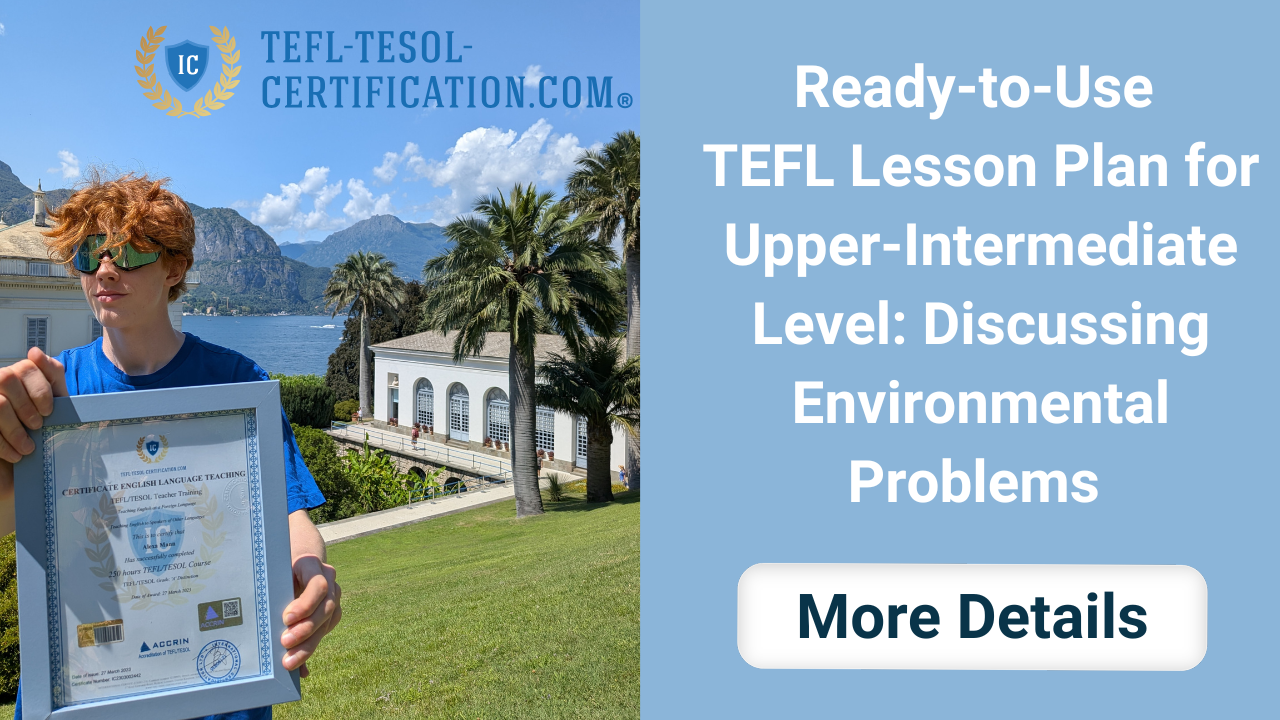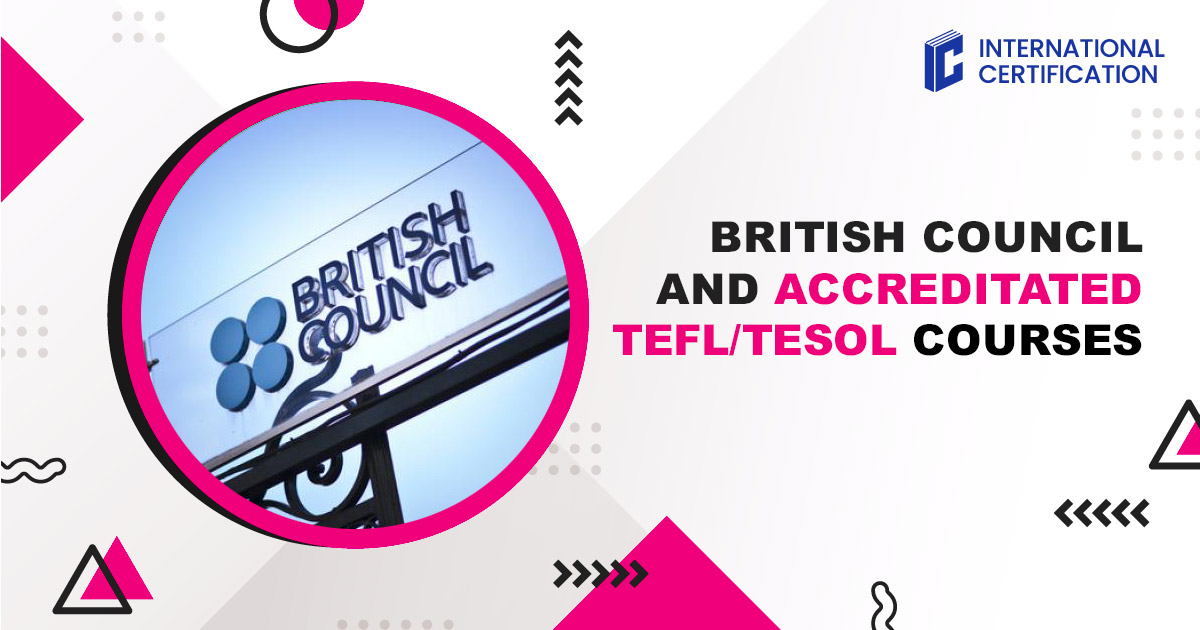And start earning money 💸 by teaching English in your own country, abroad, or online from anywhere on the planet! 🎁 Gifts and bonuses: professional support from your personal coach 🧑🏫 and job placement assistant 💼.

Ready-to-Use TEFL Lesson Plan for Upper-Intermediate Level: Discussing Environmental Problems
Table of contents
Every English teacher has, at some point, searched for inspiration through ready-made materials. I remember early in my teaching career typing into Google: "English lesson plan environmental issues Upper-Intermediate", hoping to find the perfect plug-and-play classroom scenario. Spoiler: I didn’t. 😅 But that search led me to start crafting my own effective lesson plans tailored to real classroom dynamics. One of my most successful lessons turned out to be about environmental problems—students engaged so passionately that I knew I had to share this experience with fellow teachers.
My name is York Fern, a TEFL/TESOL-certified English teacher with over 12 years of experience. I teach online and travel the world, working with students from different cultures and backgrounds. Seeing oceans, forests, and cities with my own eyes has made the topic of environmental issues feel deeply personal. In this post, I’ll walk you through how to teach environmental concerns in a way that’s engaging, meaningful, and ideal for Upper-Intermediate (B2+) learners. You’ll learn why this topic is so powerful, how to structure your lesson, and what activities bring it to life.
Why Teach Environmental Issues in an English Lesson?
Think the environment is too complex a topic for ESL learners? On the contrary—it’s a goldmine for communication and vocabulary-building at the B2-C1 level. Here's why:
1. Relevance fuels motivation
Environmental problems are part of our students’ daily lives. From climate change news to sustainability movements on social media, they’re already exposed to these ideas. That relevance makes learners eager to speak and share.
2. Vocabulary expansion
Environmental topics naturally introduce high-frequency and academic terms: climate change, renewable energy, greenhouse gases, biodiversity. They’re context-rich and help learners grow their vocabulary meaningfully.
3. Critical thinking development
This isn’t just about grammar—it’s about analysing, evaluating, and problem-solving. Students debate, compare solutions, and express opinions. These are real-world communication skills.
Personal Insight: Students Care More Than You Think
When I first introduced this topic, I worried: Will it be too serious? Too difficult? But from the warm-up alone, students jumped in with stories and opinions. Someone mentioned a factory shutting down in their town for environmental reasons. Another shared how they recycle religiously. The class was energized, and time flew by.
Today’s learners—especially those influenced by TikTok and global news—are aware of the world’s challenges. They might not know words like carbon footprint right away, but they have something to say. As TEFL teachers, our job is to help them say it in English.
This is why a lesson plan on environmental problems isn’t just about teaching vocabulary—it’s about connecting language with identity, values, and the real world.
How to Build an ESL Lesson Plan on Environmental Problems (B2 Level and Up)
Let’s get practical. Here’s how to structure an effective and engaging Upper-Intermediate environmental issues lesson plan:
1. Define a Clear Lesson Objective
Choose 1–2 communicative goals. For example:
-
Practice discussing environmental problems
-
Learn 10 new vocabulary items
-
Develop opinion-based speaking skills
Clarity helps you design focused activities and measure progress.
2. Assess Background Knowledge
Even at the same CEFR level, students have different experiences. Some may be passionate about ecoactivism; others may be new to the topic. Always start by checking what they know. This also builds confidence.
3. Plan Varied Activities
Mix up the formats! Don’t just stick to discussion. Include:
-
A short reading or video
-
Pair or small group brainstorming
-
A role-play or debate
-
A creative task (like designing an eco-poster)
This keeps the lesson dynamic and accessible for different learning styles.
4. Encourage Student Ownership
Give learners the floor. Ask for mini-presentations, opinions, or personal stories. Engagement skyrockets when they feel they own the content.
5. Adapt Ready-Made Materials
Yes, you can download an environmental lesson plan PDF, but customize it! Add local context. Change the questions. Integrate your students’ reality.
My most memorable lessons started from a simple worksheet—but were transformed by student input and teacher creativity.
Step-by-Step Environmental Problems Lesson Plan (B2 ESL Learners)
💡 Unlock the secrets to doubling your teaching income with our exclusive checklist! 🎯 This checklist is designed for English teachers who want to 📈 attract more students and 🔥 keep them engaged for the long term.
Warm-up: Get the Conversation Flowing
-
Brainstorming in pairs: Ask students to list as many environmental issues as they can in one minute. Share with the class.
-
Fact or Myth quiz: Present 3–5 environmental statements. Students decide true or false. Example: "The Great Pacific Garbage Patch is larger than France."
-
Image prompts: Show 2–3 photos (e.g., melting iceberg, polluted city). Ask students what they see and which problem it represents.
Goal: Lower the affective filter and spark curiosity.
Vocabulary Focus
-
Matching activity: Provide key terms and mixed-up definitions. Students match and discuss.
-
Image cards: Match environmental problems with emojis or illustrations.
-
Personal stories: Ask "Have you ever done anything eco-friendly?" Note down student phrases and turn them into a class-made vocabulary board.
Goal: Introduce 8–10 high-impact expressions (e.g., renewable energy, deforestation, biodegradable, climate strike).
Input Activity: Reading or Video
-
Short video (2–3 min): National Geographic or BBC clips on pollution or climate action. Ask students to count the concerns or identify one shocking fact.
-
Adapted article: e.g., how recycled plastic is used to make bricks in Kenya. Read and discuss.
-
Case study: Tell a short real or imagined story and ask students to react: “A small town banned plastic. Did it work?”
Goal: Provide authentic context and content-rich input.
Speaking Practice: Discussions & Tasks
-
Open discussion questions (e.g., "Which environmental problem worries you most and why?")
-
Role-play: Groups act as eco-councils solving specific issues.
-
Debate: "Modern lifestyle is more important than environmental concerns."
-
Creative task: Design a slogan/poster for an eco-campaign or list 5 easy eco-friendly actions.
Goal: Activate vocabulary and fluency through meaningful communication.
🚀 More students, 💰 higher income, 🌍 complete freedom! ✅ 112 verified platforms with top rates ⏳ Flexible schedule – work whenever and as much as you want 🎯 Simple requirements – start earning right away 💎 Boost your career and income by teaching students worldwide!
Wrap-Up: Reflect and Inspire
-
Reflection question: "What’s one new thing you learned today?"
-
Personal pledge: "One eco-friendly action I will do this week is…"
-
Homework: Write a short paragraph or audio message titled "My Green Life" or find one positive eco-news story for next class.
Final Thoughts for TEFL Teachers
Environmental topics are more than just a lesson—they’re a doorway to real conversations and critical global awareness. Don’t be afraid to dive into “big” topics with your students. With the right scaffolding and flexibility, even abstract issues become approachable, engaging, and unforgettable.
So whether you’re a seasoned TEFL teacher or just getting TEFL & TESOL certified, this environmental lesson plan for Upper-Intermediate ESL learners is a powerful tool in your teaching toolkit. 🌿
Terms used:
ESL, TEFL

York Fern
An English instructor with 12+ years of experience. I work for an online school and travel the world, teaching students from various countries, leveraging my TEFL/TESOL certification. Seeing the world's oceans, mountains, and cities with my own eyes has given me a profound appreciation for the importance of quality education and international communication.
and start earning by teaching English in your country, abroad, or online from anywhere in the world! Order the course with a 50% discount 💸 and receive as a gift the support of a personal coach 👨🏫 and job placement assistant! 🎁🚀 Hurry, limited spots available! 🏃♂️💨
💡 Unlock the secrets to doubling your teaching income with our exclusive checklist! 🎯 This checklist is designed for English teachers who want to 📈 attract more students and 🔥 keep them engaged for the long term.
🚀 More students, 💰 higher income, 🌍 complete freedom! ✅ 112 verified platforms with top rates ⏳ Flexible schedule – work whenever and as much as you want 🎯 Simple requirements – start earning right away 💎 Boost your career and income by teaching students worldwide!
choose us?



